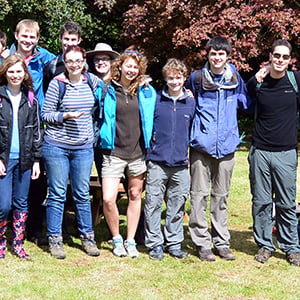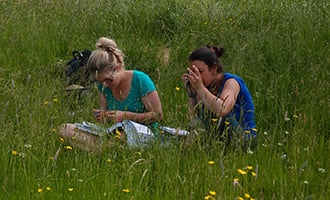
Biology
Course overview
UCAS code: C100
Entrance requirements: A*AA (with the A* in a science or Maths)
Course duration: 4 years (MBiol); 3 years (BA)
Subject requirements
Required subjects: Biology and either Chemistry, Physics or Maths
Recommended subjects: Not applicable
Helpful subjects: Not applicable
Other course requirements
Admissions tests: None
Written Work: None
Admissions statistics*
Interviewed: 46%
Successful: 15%
Intake: 112
*3-year average 2023-25
Contact
Email: [email protected]
Unistats information for this course can be found at the bottom of the page
Please note that there may be no data available if the number of course participants is very small.
About the course
Biology, the study of life, is an exciting and rapidly developing subject. Recent years have witnessed tremendous progress catalysed by technological breakthroughs and the integration of different biological approaches and disciplines. These advances in Biology are playing a key role in addressing global challenges, from disease and poverty to biodiversity loss and climate change.
This revised and upgraded Oxford Biology course was first introduced in 2019. The structure of the course encourages a cross-disciplinary approach. Following an introduction to fundamental biological principles in the first year, the second and third years allow students to choose options of particular interest and specialise in these areas with increasing depth. The options cover a comprehensive range of topics, which currently include but are not limited to:
- animal behaviour and physiology
- cell biology
- conservation
- developmental biology
- disease biology and host-microbe interactions
- ecology
- evolutionary biology
- genomics
- plant physiology and molecular biology.
The course offers an optional fourth year. This means that students can either leave after three years with a BA or choose to stay on for the fourth year, where they complete an extended research project under the supervision of qualified academic staff. Progression to the fourth year is contingent on satisfactory academic performance in the second and third years.
The Biology degree is taught by the Department of Biology, with almost all teaching taking place in the new Life and Mind Building – a state-of-the-art, purpose-built facility. Additional resources include the Oxford University Museum of Natural History, the Botanic Garden, the Herbarium, the Arboretum, the John Krebs Field Station and Wytham Woods. There is a compulsory UK residential field course to introduce field biology in the first year. Research Skills courses, both lab- and field-based, are also available in the second year.
The course puts a strong emphasis on research skills training, which is an integral part of teaching across all years. Compulsory skills training in the first year includes carefully selected dissections that have been designed with animal welfare and conservation principles in mind.
Skills training in the second year is also compulsory and covers a whole range of more advanced practical and quantitative skills essential to a modern biologist. In the last part of the second year, students choose from a range of extended skills courses that last around two weeks. Examples include avian behaviour, digital morphology, ecological fieldwork and plant molecular biology.
In the third year, students specialise on a narrower range of options, and skills training continues in the form of journal clubs and computer skills practicals.
Students will be taught by experienced Professors, Associate Professors, Departmental Lecturers and Tutors. Some teaching, such as assistance in practicals and tutorials, will also be provided by postgraduate students and postgraduate researchers.
 |  |  |
'Throughout my whole life my head has buzzed with questions; questions about humans, plants, the oceans and the microscopic world invisible to the naked eye. Oxford offers me the answers to these questions. It’s incredible! There’s loads of practical work, from a brilliant week-long field trip in the UK in your first year, to tropical Borneo in your second. Lab work is a great chance to test the theories you’ve learnt in lectures and the supervisors are always happy to offer help and explanation.' Claire | 'I'd always been interested in biology from a young age. I'd loved learning about the human body and was practically brought up on David Attenborough documentaries – therefore, learning more about the subject was a natural fit! The course at Oxford in particular spanned the whole topic, covering everything there is to know, and I liked the flexibility this could give me, simultaneously allowing me to learn about a broad spectrum of topics but also enabling me to discover what I found most interesting and specialise accordingly! It has also taught me more about the practical skills required, and thus the course has really helped me to become a well-rounded biologist.' Stephanie | 'With biology, there's no shortage of new and exciting research going on, and the breadth of content in the first year is just mind-blowing! It's a really great idea to give students a taste of all aspects of the subject today, as from the second year onward there are increasing opportunities for specialisation. That ability to drop less interesting topics and really focus on the ones you love is a most welcome form of flexibility.' Alexandros |
Unistats information
Discover Uni course data provides applicants with Unistats statistics about undergraduate life at Oxford for a particular undergraduate course.
Please select 'see course data' to view the full Unistats data for Biology.
Please note that there may be no data available if the number of course participants is very small.
Visit the Studying at Oxford section of this page for a more general insight into what studying here is likely to be like.
Biology
A typical week
In the first year, your typical weekly timetable can be broken down into the following categories:
- Lectures: around eight hours.
- Research skills: around six hours of laboratory practical demonstrations (practicals), one hour of computer practicals and one hour of group discussion.
- Tutorials: this will depend on individual colleges, but on average one hour, plus preparation time.
- Self-study: this will depend on different periods of the year, but on average 15 hours.
In the second and third years, the lecture and research skills workload remains roughly the same although there is a greater element of choice over the subjects studied.
In the third and fourth years, variable hours are also spent on research projects.
Lectures and practical class sizes will vary depending on the options chosen, ranging from as few as 20 students in a class up to potentially 120 students in a class.
Most tutorials, classes, and lectures are delivered by staff who are also college tutors in their subject. Many are world-leading experts with years of experience in teaching and research. Some teaching may also be delivered by trained PhD students and early career researchers with hands-on research experience.
To find out more about how our teaching year is structured, visit our Academic Year page.
Course structure
Year 1
Courses | Assessment |
|---|---|
| Three written exam papers (assessing lecture material and research skills); assessed practical write-ups |
Students must pass the Prelim examination at the end of year 1 to be permitted progression to year 2.
Year 2
Courses | Assessment |
|---|---|
| Two written exam papers; coursework |
Year 3
Courses | Assessment |
|---|---|
A full list of current options is available on the Biology website. | Three written exam papers; coursework |
Year 4 (Optional MBiol*)
Courses | Assessment |
|---|---|
| Dissertation |
* Students can choose to leave after three years and graduate with a BA, or they can continue to a fourth year and graduate with an MBiol. Progression to the MBiol is contingent on satisfactory academic performance in the second and third years.
The content and format of this course may change in some circumstances. Read further information about potential course changes.
Academic requirements
Qualification | Requirement |
|---|---|
A-levels: | A*AA – Biology and either Chemistry, Physics or Mathematics are required, and the A* must be in a science or Mathematics (view the full list of subjects in which an A* grade will be acceptable) |
Advanced Highers: | AA/AAB |
International Baccalaureate (IB): | 39 (including core points) – Biology and either Chemistry, Physics or Mathematics are required with 7 in HL Mathematics or a science |
Any other equivalent qualifications: | View information on other UK qualifications, and international qualifications. |
Wherever possible, your grades are considered in the context in which they have been achieved.
Read further information on how we use contextual data.
Subject requirements
| Essential: | Candidates are required to have Biology and either Chemistry, Physics or Mathematics to A-level, Advanced Higher, Higher Level in the IB or another equivalent. |
|---|
If a practical component forms part of any of your science A‐levels used to meet your offer, we expect you to pass it.
If English is not your first language you may also need to meet our English language requirements.
Applying
All candidates must follow the application procedure as shown on our Applying to Oxford pages.
The following information gives specific details for students applying for this course.
All applicants must apply for the MBiol. Students can choose to leave after three years and graduate with a BA, or they can continue to a fourth year and graduate with an MBiol. Progression to the fourth year is contingent on satisfactory academic performance in the first year and across the second and third years.
Written work and admissions tests
You do not need to take a written test or submit any written work as part of an application for this course.
What are tutors looking for?
Tutors are looking for evidence of enthusiasm for biology and aptitude for independent and analytical thinking.
In order for your application to be competitive, it is essential that you display genuine passion for Biology in your UCAS form. You are unlikely to be shortlisted for interview if your personal statement does not make it clear that Biology is your preferred course of study.
Please note that this course is not a human biology or medical themed course. If this is your particular area of interest, Oxford offers courses such as:
Interviews are not designed to test factual knowledge primarily, but rather to assess an applicant’s ability to think critically and independently, and their curiosity and passion for Biology. Be prepared to talk about particular aspects of biology that you find personally interesting. Similarly, be prepared to discuss Biology beyond your knowledge. Tutors will not necessarily be interested in whether you know the answer or whether your answer is correct, instead they will be interested in your thinking process.
The process is rigorous but sympathetic. Applicants may be asked to examine and comment on biological diagrams or images, or to interpret a graph, a written passage or a simple set of data, provided during the interview.
Visit the Biology website for more detail on the selection criteria for this course.
Careers
Around 40% of Oxford biology graduates go on to further study such as a research doctorate or postgraduate course in an applied field, while the vast majority of the remainder embark on a professional career in areas as diverse as education, finance, research, not for profit, health, environmental work, law, media, marketing, and consultancy.
Hannah, now a research assistant at the Royal Veterinary College, reports:
‘My degree gave me a keen interest in my subject and the skills to pursue it. So far I have tracked rhinos across deserts, chased birds across oceans, and am currently working with chickens!’
After graduation, Jenny spent several years in a medical communication agency environment and now has her own business, working directly with major global pharmaceutical companies. She explains:
‘The tutorial system and writing opportunities during my degree were critical in developing the skills needed to analyse and interpret data, present them clearly and concisely in context and discuss results of clinical trials.’
The new Biology course was introduced for the first time in 2019; hence information on graduate careers data is currently limited. The information reported here is therefore based on the more extensive data from the previous 3-year BA in Biological Sciences, corroborated by information from the first few cohorts of graduates from the new course.
We don't want anyone who has the academic ability to get a place to study here to be held back by their financial circumstances. To meet that aim, Oxford offers one of the most generous financial support packages available for UK students and this may be supplemented by support from your college.
Fees
Please note that for full-time Home undergraduate students, current university policy is to charge fees at the level of the cap set by the government, which for 2026/27 is £9,790. For details of annual increases, please see our guidance on likely increases to fees and charges. In the 2027/28 academic year course fees for Home fee status students will rise to £10,050 (in line with the government fee cap).
Fee status | Annual Course fees |
| Home | £9,790 |
| Overseas | £62,820 |
Further details about fee status eligibility can be found on the fee status webpage.
For more information please refer to our course fees page. Fees will usually increase annually. For details, please see our guidance on likely increases to fees and charges.
Living costs
Living costs at Oxford might be less than you’d expect, as our world-class resources and college provision can help keep costs down.
Living costs for the academic year starting in 2026 are estimated to be between £1,405 and £2,105 for each month you are in Oxford. Our academic year is made up of three eight-week terms, so you would not usually need to be in Oxford for much more than six months of the year but may wish to budget over a nine-month period to ensure you also have sufficient funds during the holidays to meet essential costs. For further details please visit our living costs webpage.
Financial support
Home | A tuition fee loan is available from the UK government to cover course fees in full for Home (UK, Irish nationals and other eligible students with UK citizens' rights - see below*) students undertaking their first undergraduate degree**, so you don’t need to pay your course fees up front. In 2026 Oxford is offering one of the most generous bursary packages of any UK university to Home students with a family income of around £50,000 or less, with additional opportunities available to UK students from households with incomes of £32,500 or less. The UK government also provides living costs support to Home students from the UK and those with settled status who meet the residence requirements. *For courses starting on or after 1 August 2021, the UK government has confirmed that EU, other EEA, and Swiss Nationals will be eligible for student finance from the UK government if they have UK citizens’ rights (i.e. if they have pre-settled or settled status, or if they are an Irish citizen covered by the Common Travel Area arrangement). The support you can access from the government will depend on your residency status. |
Islands | Islands students are entitled to different support to that of students from the rest of the UK. Please refer the links below for information on the support to you available from your funding agency: |
Overseas | Please refer to the "Other Scholarships" section of our Oxford Bursaries and Scholarships page. |
**If you have studied at undergraduate level before and completed your course, you will be classed as an Equivalent or Lower Qualification student (ELQ) and won’t be eligible to receive government or Oxford funding
Additional Fees and Charges Information for Biology
Please note that despite the University's efforts to subsidise the course, fieldwork may require financial contributions from the student.
First-year students are required to undertake a UK-based residential field course in the summer term (typically 6 days). You will study living organisms in a range of environments, both terrestrial and marine, and the content is assessed as part of the first-year examinations. The University covers all costs for this compulsory trip, including food and accommodation.
Towards the end of the second year, you will complete one of a range of optional skills courses. The range of courses offered will include some optional field trips away from Oxford. In 2026, these trips will include:
- Oxford and Dorset: to study conservation programmes aiming to reverse biodiversity loss;
- Northern Ireland and Wytham: to study the field ecology of birds, split between Northern Ireland and our field-study centre in Oxford;
- Borneo: to study tropical rainforest ecology of both animals and plants.
As a guide, estimated costs for these optional courses in 2026 are:
- £440 for Oxford/Dorset;
- £475 for Northern Ireland/Wytham, plus whatever students spend on lunches and evening meals during the trip;
- £2000 for Borneo.
If you stay on for the fourth year, as part of your course requirements, you will undertake a research project. While the Department provides funds toward reasonable research expenses for each project, depending on your choice of topic and the research tools required, the project may require additional financial support, and in exceptional circumstances, for example, if you choose to conduct supplementary work, you may be asked to contribute to these costs.
Contextual information
Unistats course data from Discover Uni provides applicants with statistics about a particular undergraduate course at Oxford. For a more holistic insight into what studying here is likely to be like, please view the information below and explore our website more widely.
The Oxford tutorial
College tutorials are central to teaching at Oxford. Typically, they take place in your college and are led by your academic tutor(s) who teach as well as do their own research. Students will also receive teaching in a variety of other ways, depending on the course. This will include lectures and classes, and may include laboratory work and fieldwork. However, tutorials offer a level of personalised attention from academic experts unavailable at most universities.
During tutorials (normally lasting an hour), college subject tutors will give you and one or two tutorial partners feedback on prepared work and cover a topic in depth. The other student(s) in your tutorials will typically be doing the same course as you and covering the same topic. Such regular and rigorous academic discussion develops and facilitates learning in a way that isn’t possible through lectures alone. Tutorials also allow for close progress monitoring so tutors can quickly provide additional support if necessary.
Read more about tutorials and an Oxford education
College life
Our colleges are at the heart of Oxford’s reputation as one of the best universities in the world.
- At Oxford, everyone is a member of a college as well as their subject department(s) and the University. Students therefore have both the benefits of belonging to a large, renowned institution and to a small and friendly academic community. Each college or hall is made up of academic and support staff, and students. Colleges provide a safe, supportive environment leaving you free to focus on your studies, enjoy time with friends and make the most of the huge variety of opportunities.
- Each college has a unique character, but generally their facilities are similar. Each one, large or small, will have the following essential facilities:
- Porters’ lodge (a staffed entrance and reception)
- Dining hall
- Lending library (often open 24/7 in term time)
- Student accommodation
- Tutors’ teaching rooms
- Chapel and/or music rooms
- Laundry
- Green spaces
- Common room (known as the JCR).
- All first-year students are offered college accommodation either on the main site of their college or in a nearby college annexe. This means that your neighbours will also be ‘freshers’ and new to life at Oxford. This accommodation is guaranteed, so you don’t need to worry about finding somewhere to live after accepting a place here, all of this is organised for you before you arrive.
- All colleges offer at least one further year of accommodation and some offer it for the entire duration of your degree. You may choose to take up the option to live in your college for the whole of your time at Oxford, or you might decide to arrange your own accommodation after your first year – perhaps because you want to live with friends from other colleges.
- While college academic tutors primarily support your academic development, you can also ask their advice on other things. Lots of other college staff including welfare officers help students settle in and are available to offer guidance on practical or health matters. Current students also actively support students in earlier years, sometimes as part of a college ‘family’ or as peer supporters trained by the University’s Counselling Service.
Connect with us
Outreach programmes and events
Many academic departments and faculties at Oxford have dedicated outreach events and activities aimed at promoting their subject area(s) and supporting talented students from all backgrounds to apply to their courses.
University-wide events and resources
In addition to exploring department-run activities, we recommend checking out the outreach event calendar for upcoming University-wide events and other subject and college activities.
Subject-specific resources supporting supercurricular engagement for all ages can also be found via the University's Digital Resource Hub, suggested subject resources webpage and Oxplore, our online learning platform for 11-to-18-year-olds.
UK state school students interested in this or similar courses may like to explore UNIQ, Oxford's free flagship outreach programme for students in their first year of further education. UNIQ offers a choice of academic residentials in over 30 courses and each year provides around 1,500 students with the opportunity to experience Oxford's teaching, explore student life and receive expert support with their application to university.
Prospective applicants can sign up to receive step-by-step support with their Oxford application.
Read more about Oxford's widening access initiatives and other ways to connect with us before applying.

